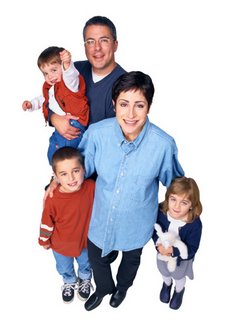 I am in the middle of preparing for a microeconomics exam that I’ll take this coming Monday. I just finished reading Chapter 13 of Steven Landsburg’s excellent book “Fair Play”. Landsburg wrote the second economics book I ever read (which we’re also using for this class) and his insights are as fresh to me now as they were when I first read him.
I am in the middle of preparing for a microeconomics exam that I’ll take this coming Monday. I just finished reading Chapter 13 of Steven Landsburg’s excellent book “Fair Play”. Landsburg wrote the second economics book I ever read (which we’re also using for this class) and his insights are as fresh to me now as they were when I first read him.The chapter I just read (entitled "People Wanted") discusses the joy that children bring and the benefit they give not only to parents, but also to all of society.
Here are a few highlights:
People solve problems, and when there are more people, more problems get solved.With exceptional brilliance, Landsburg goes on to analyze the benefits of having more kids:
The reason you are wealthier than your grandparents, and the reason your grandchildren will be wealthier than you, is that each generation free rides on the inventiveness of its ancestors.
...
A large population brings many blessings besides prosperity. We value our neighbors not just as potential trading partners, but as potential friends and potential mates. We value our children for reasons that have little to do with their earning capacity. A lot of people prefer New York to Montana, or Calcutta to the surrounding countryside, because there are advantages to living in a crowd.
Your birth brought costs and benefits to your family and to society at large. Here’s what we know about those costs and benefits:Landsburg concludes this chapter by saying (emphasis mine):
1) The benefits to society exceed the benefits to your family, because the benefits to society include the benefits to your family (which, after all, is part of society), as well as your contributions to the prosperity and happiness of others.
2) We can presume that according to your parents’ calculations, the benefits to your family exceed the costs to your family; otherwise you wouldn’t be here.
3) The costs to your family are approximately equal to the costs to society, because the major costs to society are in the form of resource consumption, and the resources you consume (except for those you produce and those you trade for) come from other members of your family.
4) Combining the first three points, we can infer that the benefits to society exceed the costs to society. And the same is true for every child born.
The instant my daughter Cayley was born, my family’s per capita income fell by one third. If per capita income is the right measure of human happiness, that must have been the worst moment of my life. But it didn’t feel that way.Very well said, indeed! Looks like the biblical mandate to “be fruitful and multiply” also makes great economic sense, helping make the world a better place in the a variety of ways.
Economist Peter Bauer has pointed out that if per capita income is the right measure of human happiness, then the birth of a farm animal is a blessing and the birth of a child is a curse. But nobody thinks that way, because there is more to life than per capita income.
Reading stuff like this about kids makes me want to get married, settle down and start having some of my own. (I can’t think of anything that would make my mom and dad more happy…)
I highly recommend Landsburg’s excellent book! (You can read a sample chapter here.) It takes some great economic insights and ties them into fresh ways of looking at some of the more important stuff in life like family, fairness and fun.
No comments:
Post a Comment